Letters to the Editor Published on September 19, 2025
In recent political discourse, a significant divide has emerged as various figures grapple with current events in the United States. Recently, President Donald Trump faced scrutiny over his decision-making regarding the honoring of public figures following their deaths. Specifically, a question arose concerning the lack of a flag-lowering order in memory of Melissa Hortman, a late Minnesota House speaker and Democrat murdered earlier this year. In contrast, flags were lowered to half-staff for Charlie Kirk, a controversial conservative figure recently deceased. When confronted with this question, President Trump reportedly responded with confusion, asking, “Who?” but later acknowledged Hortman’s identity when prompted.
In light of Hortman’s tragic passing, many scrutinized Trump’s response, interpreting it as indicative of his prioritization of certain political figures over others, ultimately reflecting a broader issue of selective recognition in political spheres. Trump’s justification for not lowering flags rested on the absence of a request from Governor Tim Walz; however, critics argue that this insufficiently addresses the moral implications of Hortman’s death.
Adding to the discourse, Senator John Fetterman caused ripples by claiming that Trump could not be considered an autocrat due to his electoral victory—a statement that drew sharp criticism. Many pointed out that historical contexts reveal elected leaders, such as Vladimir Putin and Viktor Orbán, who exhibited autocratic behaviors despite their democratic elections. This highlights a fundamental misunderstanding of the concept of autocracy, which is defined more by actions than by electoral legitimacy.
The controversy surrounding public sentiment towards Kirk further complicates the narrative. Despite his polarizing comments and opinions that often triggered outrage, Kirk was given a public honor that some constituents found inappropriate. The improper juxtaposition of honoring Kirk’s legacy while neglecting the somber reality of political violence against public officials raises questions about national values and the emotional reactions surrounding these events.
Compelling arguments from the public suggest a broader skepticism regarding the preservation of cultural heritage amid political pressures. Notably, initiatives impacting historical sites and the representation of American history are being debated vigorously. Critics urge caution against whitewashing history, arguing that altering narratives undermines societal collective memory and heritage.
As discourse continues to evolve, the topic of selective outrage, the definitions of democracy versus autocracy, and the importance of cultural integrity remains at the forefront of American political dialogue. Engaging thoughtfully with these issues is essential for fostering a society that values truth, dignity, and democracy. The ongoing public conversation invites a deeper examination of the implications of political actions and words on collective societal values, civic duties, and the essential fabric of the nation.
Media News Source







